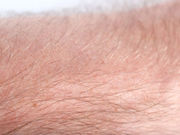Patient received localized IFN-β treatment after resection of malignant melanoma on right thigh
MONDAY, Jan. 11, 2016 (HealthDay News) — Excessive hair growth can occur after local administration of interferon (IFN)-β treatment for malignant melanoma, according to a letter to the editor published online Dec. 12 in the Journal of Dermatology.
Akiha Inoue, M.D., from the University of Occupational and Environmental Health in Kitakyushu, Japan, and colleagues describe a case of excessive hair growth due to local administration of IFN-β in a patient with malignant melanoma. The patient was a 42-year-old woman who had a black, slightly keratotic tumor on her right thigh. The tumor was diagnosed as seborrheic keratosis and was resected with a margin of a few millimeters. The patient wanted additional therapy and was injected locally with IFN-β dissolved in 2 mL of 1 percent procaine solution.
According to the authors, the patient noticed hair fiber elongations around the surgical wound nine days after initiation of IFN-β injections. At one-month follow-up, the hairs grew further. The elongated hair fibers were much thicker around the knee than around the wound in trichoscopic examination.
“We should bear in mind that hypertrichosis may be one of the adverse events of IFN-β injections,” the authors write. “Further accumulation of the cases with this side-effect using sodium chloride for dissolution of IFN-β will confirm that hypertrichosis is really due to IFN-β and not due to procaine.”
Full Text (subscription or payment may be required)
Copyright © 2016 HealthDay. All rights reserved.








